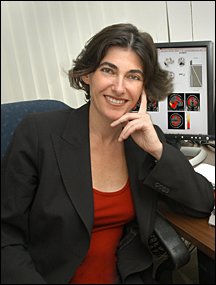‘Insight’ Deficit May Explain Denial in Drug Addiction
Researchers explore role of mental-illness hallmark at neuroscience symposium
November 16, 2008
WASHINGTON, D.C. — Drug abusers are often characterized as being in “denial” — not recognizing the severity of their disorder. Although “denial” is often considered to be a form of deception, emerging research suggests that it may be due to a specific brain dysfunction similar to that observed in other neuropsychiatric illnesses.
Scientists from a variety of fields will present relevant research during a symposium on “Impaired Insight into Illness in Drug Addiction” at the Society for Neuroscience annual meeting in Washington, D.C., November 16, 2008, 8 a.m. - 11 a.m., Washington Convention Center, Ballroom B. Rita Z. Goldstein, a psychologist who leads the neuropsychoimaging group at the U.S. Department of Energy’s (DOE) Brookhaven National Laboratory, is chair of this symposium; Steve Grant of the National Institute on Drug Abuse (NIDA) will co-chair it.
“The more we understand about the brain mechanisms affected by drugs of abuse and that underlie addiction, the better equipped we will be to address its complex and difficult-to-treat symptoms, including relapse triggered by exposure to cues outside of conscious awareness, and altered perceptions of internal responses and cognitive performance,” said Nora D. Volkow, Director of NIDA, who will serve as a discussant at the symposium. “This knowledge will lead to the development of more responsive, integrated treatments.”
Brookhaven’s Goldstein explains the idea of impaired insight and how it might relate to drug addiction: “Patients suffering from mental illnesses such as schizophrenia often have compromised awareness of their own symptoms and the severity of their disorder. This compromise can exacerbate symptoms and reduce responsiveness to or compliance with treatment,” she said. This “insight deficit” appears to originate from impairments in many of the same brain regions that underlie addiction symptoms — such as continued drug use despite catastrophic consequences, even when the drug is no longer pleasurable.
“It is therefore possible that these core clinical addiction symptoms — craving and compulsion and the chronic relapsing nature of addiction — may be a consequence of compromised insight,” Goldstein said. Such impaired insight might help explain why drug-addicted patients often have a hard time recognizing, accepting, and/or acknowledging their own signs and symptoms of addiction, as well as the need for treatment. It could also help explain these patients’ failure to comply fully with treatment regimens — and their tendency to relapse.
“Deficits in insight and interoception [sensitivity to the body’s internal signals] and emotional awareness have largely been ignored in the field of addiction, despite the fact that this disorder is finally recognized as a disease of the brain, amenable to intervention and treatment,” Goldstein said. “My hope is that this symposium will help bridge this gap and contribute to the design of new diagnostic tools and treatment approaches, pointing us toward more effective intervention strategies to improve prognosis in this illness.”
Symposium speakers are:
- A. D. (Bud) Craig, Atkinson Research Laboratory, Barrow Neurological Institute, will discuss the role of the specific brain regions in insight and interoception in healthy states and in psychopathology.
- Antoine Bechara, University of Southern California, will discuss the brain regions involved in impaired awareness of nicotine craving and concern about the potential long-term consequences in cigarette smoking.
- Hugh Garavan, School of Psychology & Institute of Neuroscience, Trinity College, Dublin, will discuss the role of specific brain regions in blunted awareness to errors and compromised behavioral and situational monitoring in cocaine addiction, compromises that could precipitate excessive, unintended use or relapse.
- Anna Rose Childress, Department of Psychiatry, University of Pennsylvania School of Medicine, will discuss how subcortical brain regions respond to drug-related stimuli, even without conscious awareness, and how these brain responses can predict emotional reactions and behavior in drug addiction.
- Nora D. Volkow, Director of NIDA, will summarize and draw connections between these research areas.
The Society for Neuroscience will highlight this symposium and other addiction talks at a press conference titled “Why Can’t I Forget My Last Fix?” on Monday, November 17, 2008, 3:30 – 4:30 p.m. at the Washington Convention Center.
Rita Goldstein’s work at Brookhaven Lab is funded by the DOE’s Office of Science and by NIDA.
2008-10855 | INT/EXT | Newsroom










